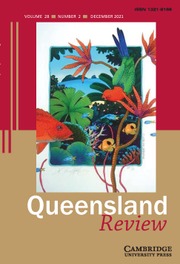No CrossRef data available.
Article contents
Regional, migrant and global affinities to place in Seeds: A Permaculture Travel Memoir
Published online by Cambridge University Press: 17 November 2017
Abstract
This article explores the traces of an author's regional identity in a transnational travel memoir in which affinities to place are portrayed as pluralistic and fluid. It does so in order to explore the tenuous balance between ecocentric understanding of self within a community of ‘earth others’ on the one hand and fidelity to a regionally precise ‘home’ on the other.1 This constitutes an open-ended encounter with regionalism and ‘site-fidelity’ to destabilise the local/global binary. New understandings of foreign landscapes, places and cultures can be brokered upon a dialogue between those newly encountered landscape places, and the more intimately known regions from an individual's past.
- Type
- Articles
- Information
- Copyright
- Copyright © The Author(s) 2017
References
Endnotes
1 Val Plumwood, quoted in Bird Rose, Deborah, ‘Val Plumwood's philosophical animism: Attentive interactions in the sentient world’, Environmental Humanities 3.1 (2013), 97.Google Scholar
2 Holmgren, David, ‘The long view’, in Dawborn, Kerry and Smith, Caroline (eds), Permaculture pioneers (Melbourne: Melliodora, 2011), p. 29 Google Scholar.
3 Caroline Smith, ‘Introduction’, in Dawborn and Smith (eds), Permaculture pioneers, p. xiv.
4 Garrard, Greg, Ecocriticism, 2nd ed. (London: Routledge, 2012), p. 117 Google Scholar.
5 Heise, Ursula, Sense of place and sense of planet (New York: Oxford University Press, 2008), p. 4 CrossRefGoogle Scholar.
6 McKay, Belinda, ‘Living in the end of time: Ecstasy and apocalypse in the work of H.D. and Janette Turner Hospital’, Queensland Review 17.2 (2010), p. 75 CrossRefGoogle Scholar.
7 Deborah Bird Rose and Libby Robin, ‘The ecological humanities in action: An invitation’, Australian Humanities Review 31–32 (2004), http://www.australianhumanitiesreview.org/archive/Issue-April-2004/rose.html.
8 Heise, Sense of place, p. 5.
9 Jones, Patrick and Ulman, Meg, The art of free travel: A frugal family adventure (Sydney: New South Publishing, 2015), p. 93 Google Scholar.
10 Rose and Robin, ‘The ecological humanities in action’.
11 Krauth, Nigel, ‘The preface as exegesis’, TEXT 6.1 (2002)Google Scholar, http://www.textjournal.com.au/april02/krauth.htm.
12 Krauth, ‘The preface as exegesis’.
13 Molz, Jennie G., ‘Social networking technologies and the moral economy of alternative tourism: The case of CouchSurfing.org.’, Annals of Tourism Research 43 (2013), 210–230CrossRefGoogle Scholar.
14 ‘Couchsurfing International Inc. is a hospitality exchange and social networking website. The website provides a platform for members to ‘surf’ on couches by staying as a guest at a hostʼs home . . . Homestays are consensual between the host and guest, and the duration, nature, and terms of the guest's stay are generally worked out in advance. No monetary exchange takes place except sometimes for compensation of incurred expenses (e.g. food). It is common practice for guests to seek non-monetary means to show their appreciation, such as bringing a gift, cooking a meal or teaching a skill.ʼ (‘Couch Surfingʼ, Wikipedia, http://en.wikipedia.org/wiki/CouchSurfing.
15 Willing Workers on Organic Farms (WWOOF) is an international network that connects volunteers with hosts in a range of countries. In exchange for food and free board, WWOOF volunteers spend a minimum of five hours per day engaged in a range of activities around their host's home/farm. These activities might include, but are not limited to, gardening, maintenance, natural building, coppicing, cooking, preserving food and caring for livestock.
16 Mollison, Bill, Permaculture: A designerʼs manual (Sisters Creek, Tas: Tagari, 2012), p. ix Google Scholar.
17 Mollison, Permaculture: A designer's manual, p. ix.
18 Holmgren, David, Permaculture: Principles and pathways beyond sustainability (Hampshire: Permanent Publications, 2011), p. xix Google Scholar.
19 Johnson, Leslie M., Trail of story, travellerʼs path: Reflections on ethnoecology and landscape (Edmonton: AU Press, 2010), p. 3 Google Scholar.
20 This name has been changed to protect the identity of the individual.
22 Williams, Paul, ‘Writing the memoir of self-erasure: A practice-led exploration of constructing and deconstructing the coloniser-who-refuses’, TEXT 12.1 (2013)Google Scholar, http://www.textjournal.com.au/april13/williams.htm.
23 Smith, ‘Introduction’, p. xiii.
24 Williams, ‘Writing the memoir of self-erasure’.
25 Joni Mitchell, ‘Woodstock’.
27 Garrard, Greg, ‘The unbearable lightness of green: air travel, climate change and literature’, Green Letters: Studies in Ecocriticism 17.2 (2013), p. 117 CrossRefGoogle Scholar.
28 Holmgren, ‘The long view’, p. 29.
29 Garrard, Ecocriticism, p. 117.
30 MacFarlane, Robert in Stenning, Anna, ‘An interview with Robert MacFarlaneʼ, Green Letters: Studies in Ecocriticism 17.1 (2013), p. 82 Google Scholar.
31 The Greek name for the sugary, rose-flavoured desert known outside of Greece as ‘Turkish delight’.
32 Heise, Sense of place, p. 4.
33 Mabey, Richard, Nature cure (London: Vintage Books, 2007), p. 74 Google Scholar.
34 Garrard, Ecocriticism, p. 117; Rose and Robin, ‘The ecological humanities in action’.
35 Rose and Robin, ‘The ecological humanities in action’.
36 Heise, Sense of place, p. 5.


